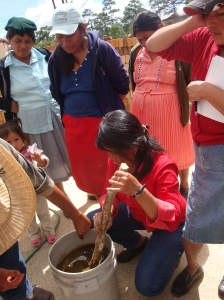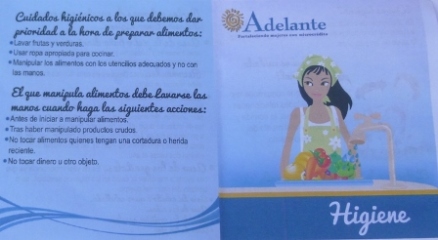
Agriculture workshop, Intibuca
Parts of this story appear in our July 2012 E-Newsletter
In the Western region of Honduras known as the Lenca Corridor, extreme poverty is widespread. As part of Adelante’s Education Program, women from this area are being offered the opportunity to participate in Product Innovation Workshops thanks to funding from Women’s Empowerment International. The goal is to provide women with practical knowledge that enables them to develop new sources of income and/or make their small businesses more competitive. Topics range from crafts to food preparation, but one of the most critical themes among the women of Western Honduras is agricultural production.
The cool climate in the Western highlands allows for the cultivation of a great variety of crops, such as berries, fruit trees, grains, and vegetables. Even still, producers often lack knowledge on how to maximize the productivity of their land. Part of the problem is the lack of training opportunities for local producers in the area. By offering workshops on agriculture, Adelante is trying to bridge this gap and help clients who are already involved in agriculture to improve their production.
So far in 2012, Adelante has hosted two agriculture workshops. The first workshop was held in April and focused on soil conversation. Women learned about the importance of using organic methods to preserve soil fertility for future generations. Recently, I had the opportunity to attend the second workshop which dealt with cultivation methods for local crops. The women spent the first day in the classroom where they were taught about how to cultivate different plant species and control pests and disease. The following day, the women visited a farming cooperative where they could learn from producers and analyze their methods. This learning methodology is called ¨campesino a campesino¨ or farmer to farmer. Danilo Mejía, the agricultural engineer responsible for leading the workshop, asked the women to discuss the positive and negative aspects of the cooperative’s farming activities. The most significant criticism to emerge from the ¨campesino a campesino¨ exercise was the overuse of chemicals in the cooperative’s fields. Danilo affirmed that organic substitutes could provide the same benefits to production that chemicals do, while preserving the soil’s fertility for future generations.

Treatment for diseased plants
The final and most popular part of the workshop was practicing how to make organic products so as to diminish the use of chemicals and improve production. Women learned how to make three different organic products: fertilizer, a treatment for diseased plants and another for fungus growth.

Treatment for fungus
The women found this knowledge extremely practical since the products were very simple and inexpensive, also making them a viable option for a business venture. For example, the organic fertilizer was composed of cow manure, unpurified water, fresh milk, molasses, and hydrogen peroxide, and the cost of producing 15 liters of fertilizer was only L. 70 or $3.50.

Organic fertilizer
Feedback from clients indicates that the knowledge acquired was very useful and the women intend to put their new skills into practice. Victoria is a long-standing client who normally uses her microloans to invest in her of business preparing and selling food from her home. However, she and her family also cultivate coffee, and are interested in growing vegetables too. Victoria especially enjoyed learning about the different natural products she could use to boost her coffee crop, she confirms, ¨We have 250 coffee trees we are ready to plant, and we are going to make this fertilizer instead of buying chemical-based products as we normally would.¨
The idea of substituting chemical products with organic ones resonated with another client, Paula, she comments, ¨We use far too many chemicals on the land, we don’t take care of it very well.¨ Paula is currently paying off her second Individual Loan for L. 16,000 or $842. Over her many loan cycles with Adelante, Paula has developed a small convenience store and has used the profits to invest in growing more crops. Today, Paula and her family cultivate potatoes, vegetables, corn and beans, and she plans to use the new farming methods she has learned to further improve her land’s productivity.

Paula recieves diploma from Adelante Education staff member
Having attended this most recent workshop, I know that the topic of agriculture is needed and wanted by Adelante’s clientele in the Lenca Corridor. Not only will these women enjoy an improved quality of life due to better farming practices, but they also will contribute to the environmental sustainability of their local communities. We would like to thank Women’s Empowerment International for its continued support of Adelante’s operations in Intibucá. At Adelante we can always use donations from our generous supporters to bolster the activities of our Education Department. Please consider making a donation and help thousands of women become successful micro entrepreneurs!














